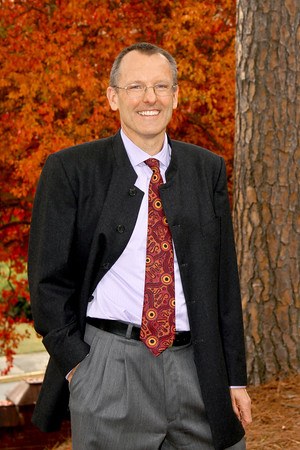This fall, Mercer Law School launched a new program allowing foreign professors, judges, and practitioners to become Visiting Scholars. As part of the new program, visiting scholars can complete research, give lectures, and collaborate with other faculty members and students on international issues. Members of the program are welcome to use the facilities and resources of the Law School in order to pursue their individual research projects. According to Professor David Ritchie, Director of International Initiatives at Mercer Law, “this is the first of several new programs designed to give members of the law school community increased exposure to international and global perspectives.”
Mercer Law was pleased to welcome the first visiting scholar this fall, Richard Dawson, an independent scholar from New Zealand with Ph.D.s in economics and law. During his two months at Mercer Law, Dawson conducted research, hosted an interdisciplinary presentation in conjunction with the College of Liberal Arts at Mercer University, and worked with faculty members and students.
Dawson provided answers to a series of questions about his time at Mercer Law:
What led to your visit to Mercer Law?
In July 2014, the Mercer Law Review invited me to participate in a symposium entitled 'The Scholarship and Teaching of Jack Sammons' in October. I jumped at the chance, for I had learned a great deal from Jack since an initial encounter with his writing in 2010. Fortunately for me, it turned out that the trip fitted with a newly instituted Visiting Scholar position at Mercer Law School.
Tell us what you were working on during your time here.
The article I wrote for the symposium engaged with talk about the 1840 treaty of Waitangi – the founding constitutional transaction between Maori peoples and a representative of Queen Victoria – in light of an encounter with Jack's work. The encounter involved an immersion into Jack's image of law, an immersion that shifted my own image of law in unexpected ways. The experience of the image-shift resembled shifts that I had had while reading some of Jack's fellow humanist legal scholars, including symposium-participants James Boyd White and Joseph Vining. After the symposium, I was inspired to write similar articles that tried to catch the drift of these shifts. I began to wonder if the shifts could be some kind of model for thought and expression about Waitangi justice, and perhaps justice in all other transactions too. Some new and big horizons have opened up!
In my first week as Visiting Scholar, I gave a faculty development talk that connected the US Constitution and the treaty. This was a bit of comparative law that focused on the magical word 'we'. It was really valuable for me to be asked questions by people who were unfamiliar with the treaty, for that which was familiar to me became less familiar in the questioning process. The de-familiarization reminded me that one reason we have 'visiting scholars' is to collectively experience a productive disorientation. In later weeks I had more such disorientation (including when talking with question-laden students), which served as a great resource for my writing.
Would you encourage others to consider the Visiting Scholar position?
Definitely! I don't think that a Visiting Scholar could want much more than regular well-directed and friendly criticism. Before arriving at Mercer, Jack Sammons had given me a good dose of such feedback, and it turned out that his manner was not unique to him but something of a cultural phenomenon at Mercer Law.
People at Mercer Law had close connections with people working in other disciplines at Mercer University. This would be a real boost for anyone doing interdisciplinary work.
What was your favorite place in Macon?
I bought much of my food from a small store called Ocmulgee Traders – this was much nearer to my residence than the big stores. The people who worked there were very helpful and friendly, and we often had most interesting and wide-ranging conversations. That experience made it the Traders a favorite place for me. Several of my colleagues at Mercer Law took me to some terrific restaurants, and these led to a very positive impression of Macon.
Did you get to travel anywhere else in the US while you were here?
In my fifth week at Mercer, I visited the University of Michigan, where I gave a faculty talk organized by the symposium participants White and Vining. While there was more good disorientation here, the big shock was the northern arctic blast. I had become acclimatized to the warm south. When I returned to Macon, it was very pleasantly strange to feel like I was back at a warm home.










